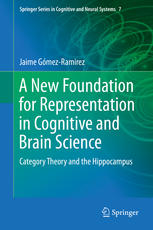

Most ebook files are in PDF format, so you can easily read them using various software such as Foxit Reader or directly on the Google Chrome browser.
Some ebook files are released by publishers in other formats such as .awz, .mobi, .epub, .fb2, etc. You may need to install specific software to read these formats on mobile/PC, such as Calibre.
Please read the tutorial at this link: https://ebookbell.com/faq
We offer FREE conversion to the popular formats you request; however, this may take some time. Therefore, right after payment, please email us, and we will try to provide the service as quickly as possible.
For some exceptional file formats or broken links (if any), please refrain from opening any disputes. Instead, email us first, and we will try to assist within a maximum of 6 hours.
EbookBell Team

4.3
48 reviewsThe purpose of the book is to advance in the understanding of brain function by defining a general framework for representation based on category theory. The idea is to bring this mathematical formalism into the domain of neural representation of physical spaces, setting the basis for a theory of mental representation, able to relate empirical findings, uniting them into a sound theoretical corpus.
The innovative approach presented in the book provides a horizon of interdisciplinary collaboration that aims to set up a common agenda that synthesizes mathematical formalization and empirical procedures in a systemic way. Category theory has been successfully applied to qualitative analysis, mainly in theoretical computer science to deal with programming language semantics. Nevertheless, the potential of category theoretic tools for quantitative analysis of networks has not been tackled so far. Statistical methods to investigate graph structure typically rely on network parameters. Category theory can be seen as an abstraction of graph theory. Thus, new categorical properties can be added into network analysis and graph theoretic constructs can be accordingly extended in more fundamental basis. By generalizing networks using category theory we can address questions and elaborate answers in a more fundamental way without waiving graph theoretic tools. The vital issue is to establish a new framework for quantitative analysis of networks using the theory of categories, in which computational neuroscientists and network theorists may tackle in more efficient ways the dynamics of brain cognitive networks.
The intended audience of the book is researchers who wish to explore the validity of mathematical principles in the understanding of cognitive systems. All the actors in cognitive science: philosophers, engineers, neurobiologists, cognitive psychologists, computer scientists etc. are akin to discover along its pages new unforeseen connections through the development of concep